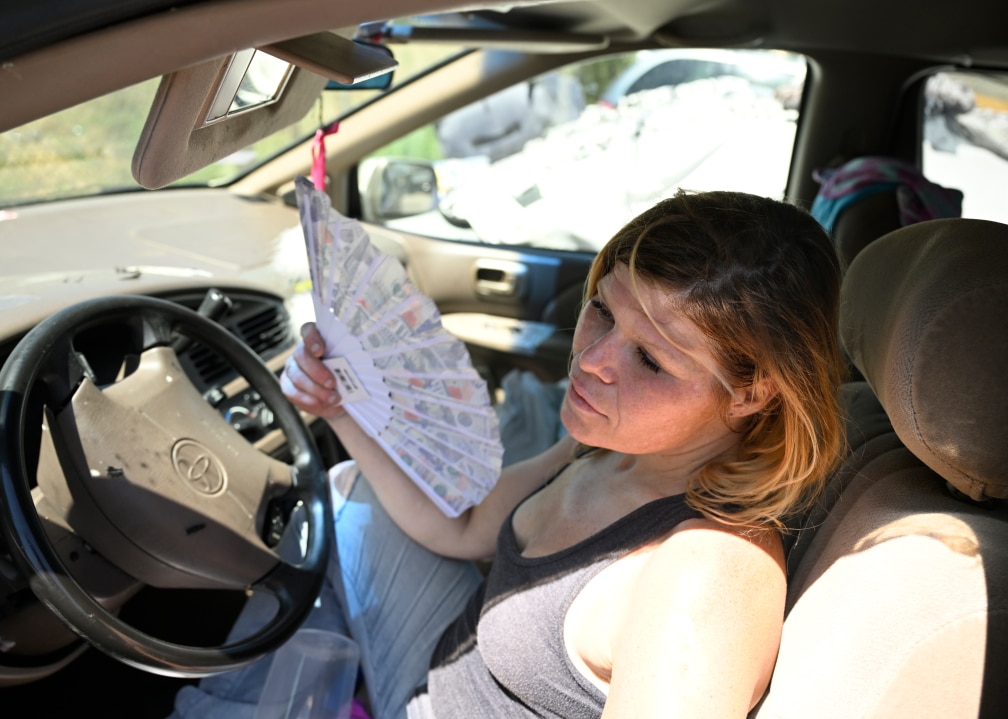
Xea Landers, 39, uses a fan to help cool down during dangerous heat on Aug. 11, 2022 in Denver. Landers said she is living in her van parked near the Salvation Army shelter in Denver. (RJ Sangosti/The Denver Post)
Denver wants to double down on a program that sets aside designated spots where individuals living out of their car can park overnight.
Denver’s Department of Housing Stability has proposed adding $600,000 to an existing contract with the nonprofit Colorado Safe Parking Initiative, allowing the group to go from two to four campsites in the city.
The existing $150,000 contract — which ran from June 2022 to the end of last month, per city documents — funded two such sites for one year. Those sites are outside First Universalist Church in southeast Denver and First Baptist Church in Cap Hill.
Each of the sites has eight spaces for those living from their car, meaning the city paid about $26 a night or $780 a month per space for the nonprofit to manage the program.

Terrell Curtis
The two additional sites, which have not been selected, will “be bigger — minimum of 10 (spaces), possibly closer to 15,” CSPI Executive Director Terrill Curtis told BusinessDen last week.
One of the new sites is targeted to open by the end of 2023, and the second by the end of August 2024.
The increase in the contract amount to $750,000 would allow the four sites to operate through the end of 2025. The current sites accept traditional passenger vehicles, but at least one of the new sites must allow for RVs, per city documents.
Colorado Safe Parking Initiative was founded by Denver residents Rochelle Brogan and Chelsey Baker-Hauck in 2019 and currently operates 13 lots in the metro area, counting the two existing in Denver, Curtis said. The largest is in Aurora and has 24 spaces.
Curtis said it can vary by site, but users are generally allowed to park from 6 p.m. to 8 a.m. The lots are established on private property, and those parking overnight must be approved by the organization in advance.
“We’re only able to accept about 20 percent of the people who reach out to us,” Curtis said.
The lot that allows RVs may operate differently because it takes more time to park those vehicles levelly, and CSPI doesn’t expect them to leave during the daytime.
Curtis said 75 percent of those approaching the organization are newly homeless. Many don’t think of themselves as homeless and say living out of their vehicle is just a temporary thing.
“They’re hanging on to that last asset,” Curtis said.
Lots are sometimes monitored by church volunteers, but in other cases CSPI pays someone staying at a particular site to serve as a “lot operator,” Curtis said.
When the first Denver location at the Universalist church opened in 2020, neighbors insisted that security be hired, but “within a few weeks, they came back and said, ‘OK, you can let it go — because there’s nothing to report,’” Curtis said.
The biggest risk is a passing vehicle-dweller thinking they can park in the lot without advance approval, Curtis said.
In terms of new Denver sites, the nonprofit hopes for locations that “would provide relatively minimal neighborhood impact,” Curtis said. An Episcopal church at the edge of downtown wanted to host vehicles but faced pushback from neighbors.
The city plans to use federal funds from the American Rescue Plan Act, a 2021 pandemic stimulus bill.
According to documents presented to the council, things that Colorado Safe Parking Initiative must provide at the sites include:
• Drinking water
• Basic hygiene services, including portable toilets and handwashing stations
• Trash and recycling collection
• “Management of security within the space and the immediate area”
• Access to case management and support services through partnerships with other organizations
• Motel vouchers or referrals to motels or emergency shelters in the case of severe weather or vehicle-repair emergencies
Access to electricity, showers, meal service and storage are “suggested” but not required by the contract.
Parking lot owners willing to host the homeless are in demand. A separate nonprofit, Colorado Village Collaborative, establishes managed campsites on them using ice fishing tents.

Xea Landers, 39, uses a fan to help cool down during dangerous heat on Aug. 11, 2022 in Denver. Landers said she is living in her van parked near the Salvation Army shelter in Denver. (RJ Sangosti/The Denver Post)
Denver wants to double down on a program that sets aside designated spots where individuals living out of their car can park overnight.
Denver’s Department of Housing Stability has proposed adding $600,000 to an existing contract with the nonprofit Colorado Safe Parking Initiative, allowing the group to go from two to four campsites in the city.
The existing $150,000 contract — which ran from June 2022 to the end of last month, per city documents — funded two such sites for one year. Those sites are outside First Universalist Church in southeast Denver and First Baptist Church in Cap Hill.
Each of the sites has eight spaces for those living from their car, meaning the city paid about $26 a night or $780 a month per space for the nonprofit to manage the program.

Terrell Curtis
The two additional sites, which have not been selected, will “be bigger — minimum of 10 (spaces), possibly closer to 15,” CSPI Executive Director Terrill Curtis told BusinessDen last week.
One of the new sites is targeted to open by the end of 2023, and the second by the end of August 2024.
The increase in the contract amount to $750,000 would allow the four sites to operate through the end of 2025. The current sites accept traditional passenger vehicles, but at least one of the new sites must allow for RVs, per city documents.
Colorado Safe Parking Initiative was founded by Denver residents Rochelle Brogan and Chelsey Baker-Hauck in 2019 and currently operates 13 lots in the metro area, counting the two existing in Denver, Curtis said. The largest is in Aurora and has 24 spaces.
Curtis said it can vary by site, but users are generally allowed to park from 6 p.m. to 8 a.m. The lots are established on private property, and those parking overnight must be approved by the organization in advance.
“We’re only able to accept about 20 percent of the people who reach out to us,” Curtis said.
The lot that allows RVs may operate differently because it takes more time to park those vehicles levelly, and CSPI doesn’t expect them to leave during the daytime.
Curtis said 75 percent of those approaching the organization are newly homeless. Many don’t think of themselves as homeless and say living out of their vehicle is just a temporary thing.
“They’re hanging on to that last asset,” Curtis said.
Lots are sometimes monitored by church volunteers, but in other cases CSPI pays someone staying at a particular site to serve as a “lot operator,” Curtis said.
When the first Denver location at the Universalist church opened in 2020, neighbors insisted that security be hired, but “within a few weeks, they came back and said, ‘OK, you can let it go — because there’s nothing to report,’” Curtis said.
The biggest risk is a passing vehicle-dweller thinking they can park in the lot without advance approval, Curtis said.
In terms of new Denver sites, the nonprofit hopes for locations that “would provide relatively minimal neighborhood impact,” Curtis said. An Episcopal church at the edge of downtown wanted to host vehicles but faced pushback from neighbors.
The city plans to use federal funds from the American Rescue Plan Act, a 2021 pandemic stimulus bill.
According to documents presented to the council, things that Colorado Safe Parking Initiative must provide at the sites include:
• Drinking water
• Basic hygiene services, including portable toilets and handwashing stations
• Trash and recycling collection
• “Management of security within the space and the immediate area”
• Access to case management and support services through partnerships with other organizations
• Motel vouchers or referrals to motels or emergency shelters in the case of severe weather or vehicle-repair emergencies
Access to electricity, showers, meal service and storage are “suggested” but not required by the contract.
Parking lot owners willing to host the homeless are in demand. A separate nonprofit, Colorado Village Collaborative, establishes managed campsites on them using ice fishing tents.
